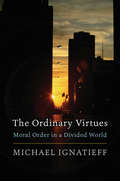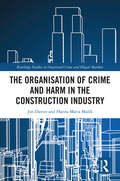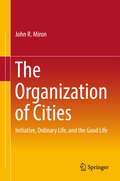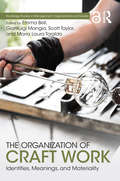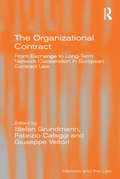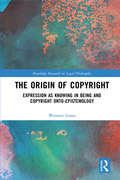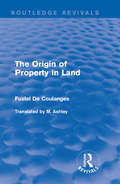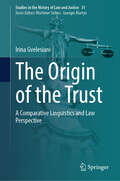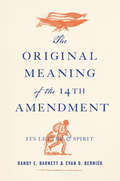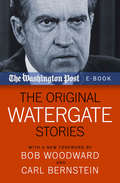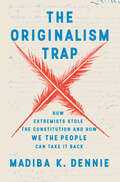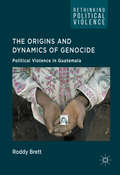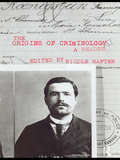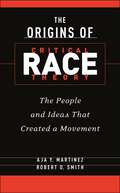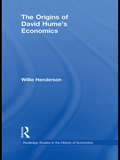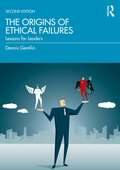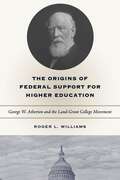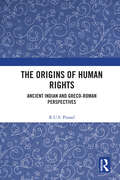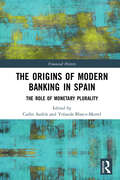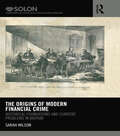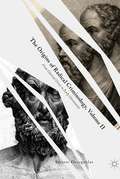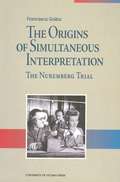- Table View
- List View
The Ordinary Virtues: Moral Order in a Divided World
by Michael IgnatieffDuring a 3-year, 8-nation journey, Michael Ignatieff found that while human rights is the language of states and liberal elites, the moral language that resonates with most people is that of everyday virtues: tolerance, forgiveness, trust, and resilience. These ordinary virtues are the moral system of global cities and obscure shantytowns alike.
The Organisation of Crime and Harm in the Construction Industry (Routledge Studies in Organised Crime)
by Jon Davies Hanna MalikDrawing on empirical work and secondary analysis from the UK and Finnish construction industries, this book contributes a deep-rooted analysis of construction industry harms that originate from corporate-industrialstate processes.The UK context arguably represents a classic ‘neoliberal’ system categorised by privatisation of services and minimal regulation, whereas Finland broadly provides a ‘social democratic’ alternative with its relatively strong national regulation and public sector oversight of industry. These concepts interlink strongly with the notion of state-corporate crime, since this perspective shifts attention away from individualistic explanations for crime and harm towards symbiosis between states and corporations. This book argues that existing explanations based on organised crime and individual ‘rogues’ are insufficient to account for the wider range and subtlety of harms that occur in construction, and therefore offers a unique perspective into organisational, industry, and state dynamics in this sector.An accessible and compelling read, this book will appeal to students and scholars of criminology, sociology, organized crime, and those interested in harms in the construction industry.
The Organization of Cities: Initiative, ordinary life, and the good life
by John R MironThis book focuses on the relationship between the state and economy in the development of cities. It reviews and reinterprets fundamental theoretical models that explain how the operation of markets in equilibrium shapes the scale and organization of the commercial city in a mixed market economy within a liberal state. These models link markets for the factors of production, markets for investment and fixed capital formation, markets for transportation, and markets for exports in equilibrium both within the urban economy and the rest of the world. In each case, the model explains the urban economy by revealing how assumptions about causes and structures lead to predictions about scale and organization outcomes. By simplifying and contrasting these models, this book proposes another interpretation: that governance and the urban economy are outcomes negotiated by political actors motivated by competing notions of commonwealth and the individual desire for wealth and power. The book grounds its analysis in economic history, explaining the rise of commercial cities and the emergence of the urban economy. It then turns to factors of production, export, and factor markets, introducing and parsing the Mills model, breaking it down into its component parts and creating a series of simpler models that can better explain the significance of each economic assumption. Simplified models are also presented for real estate and fixed capital investment markets, transportation, and land use planning. The book concludes with a discussion of linear programming and the Herbert- Stevens and the Ripper-Varaiya models. A fresh presentation of the theories behind urban economics, this book emphasizes the links between state and economy and challenges the reader to see its theories in a new light. As such, this book will be of interest to scholars, students, and practitioners of economics, public policy, public administration, urban policy, and city and urban planning. >
The Organization of Craft Work: Identities, Meanings, and Materiality (Routledge Studies in Management, Organizations and Society)
by Scott Taylor Emma Bell Gianluigi Mangia Maria Laura ToraldoThis edited book focuses on the organization and meaning of craft work in contemporary society. It considers the relationship between craft and place and how this enables the construction of a meaningful relationship with objects of production and consumption. The book explores the significance of raw materials, the relationship between the body, the crafted object and the mind, and the importance of skill, knowledge and learning in the making process. Through this, it raises important questions about the role of craft in facing future challenges by challenging the logic of globalized production and consumption. The Organization of Craft Work encompasses international analyses from the United States, France, Italy, Australia, Canada, the UK and Japan involving a diverse range of sectors, including brewing, food and wine production, clothing and shoe making, and perfumery. The book will be of interest to students and academic researchers in organization studies, marketing and consumer behaviour, business ethics, entrepreneurship, sociology of work, human resource management, cultural studies, geography, and fashion and design. In addition, the book will be of interest to practitioners and organizations with an interest in the development and promotion of craft work.
The Organizational Contract: From Exchange to Long-Term Network Cooperation in European Contract Law (Markets And The Law Ser.)
by Stefan Grundmann Fabrizio CafaggiThis book introduces and develops the paradigm of the organisational contract in European contract law. Suggesting that a more radical distinction should be made between contracts which regulate single or spot exchanges and contracts that organize complex economic activities without creating a new legal entity, the book argues that this distinction goes beyond that between spot and relational contracts because it focuses on the organizational dimension of contracting and its governance features. Divided into six parts, the volume brings together a group of internationally renowned experts to examine the structure of long-term contractual cooperation; networks of contracts; knowledge exchange in long-term contractual cooperation; remedies and specific governance rules in long-term relationships; and the move towards legislation. The book will be of value to academics and researchers in the areas of private law, economic theory and sociology of law, and organizational theory. It will also be a useful resource for practitioners working in international contract law and international business transaction law.
The Origin of Copyright: Expression as Knowing in Being and Copyright Onto-Epistemology (Routledge Research in Legal Philosophy)
by Wenwei GuanContemporary copyright was born in a heroic era of human history when technologies facilitated idea dissemination through the book trade reaching out mass readership. This book provides insights on the copyright evolution and how proprietary individual expression’s copyright protection forms an integral part of our knowing in being, driven by the advances of technology through the proliferating trading frameworks. The book captures what is central in the process of copyright evolution which is an "onto-epistemological offset". It goes on to explain that copyright’s protection of knowing in originality’s delineation of expression and fair use/dealing’s legitimization of unauthorized use and being are not isolatable, but rather mutually implicated. While the classic strict determinism has been subject to an onto-epistemological challenge, the book looks at the proliferation of global trade and advent of information technology and how they show us the beauty and possibility of intra-dependence between copyright authorship, entrepreneurship, and readership, which calls for a fresh copyright onto-epistemology. Building on its onto-epistemological critiques on the stakeholder, force, and mechanism of copyright evolution, the book helps readers understand why, not only copyright, but also law in general, and justice too, need to be onto-epistemologically balanced, as this is categorically imperative for being, the fundamental law of nature.
The Origin of Property in Land (Routledge Revivals)
by Fustel De CoulangesDe Coulanges original study provided a historical view of how land has become property which was then translated and published in 1891 by M. Ashley, not just to bring this study to an English reader but to provide a counter argument to Agrarian Communism. This edition also contains an introductory chapter on the origin of the manor house in England. This title will be of interest to students of History.
The Origin of the Trust: A Comparative Linguistics and Law Perspective (Studies in the History of Law and Justice #31)
by Irina GvelesianiThis book offers an interdisciplinary approach that covers linguistics and jurisprudence, shows the interconnectedness of law and language, singles out major theories related to the emergence of the concept of trust and discusses them from the perspective of legal linguistics. Contemporary globalizing processes change the contours of different spheres of life. Against the backdrop of ongoing changes, an overall tendency emerges of the unifying and harmonizing legal systems. The dominance of American and English law firms fuels a broader worldwide circulation of Anglo-American legal concepts and instruments. Increasing contacts of non-trust jurisdictions with trustees and trust assets promote the use of trusts and trust-like devices in civil law jurisdictions. As a result, the interest towards the entrusting relationships increases. The research in this book is based on the methods of descriptive and structural-semantic analyses. Emphasis is put on the interinfluence of the West Germanic languages and the laws of the Germanic tribes, the Salian Franks and the Anglo-Saxons. The book consults selected Franconian manuscripts, lex salica and lex ripuaria, and dictionaries for the study and interpretation of the trust-related lexical units. The results of the research shed a new light on the origin of the common law trust and its predecessor use. The book is intended for legal linguists, lawyers, legal practitioners, legal historians and for researchers and students in the fields of trust law, legal linguistics, and legal history.
The Original Meaning of the Fourteenth Amendment: Its Letter and Spirit
by Randy E. Barnett Evan D. BernickA renowned constitutional scholar and a rising star provide a balanced and definitive analysis of the origins and original meaning of the Fourteenth Amendment. Adopted in 1868, the Fourteenth Amendment profoundly changed the Constitution, giving the federal judiciary and Congress new powers to protect the fundamental rights of individuals from being violated by the states. Yet, according to Randy Barnett and Evan Bernick, the Supreme Court has long misunderstood or ignored the original meaning of the amendment’s key clauses, covering the privileges and immunities of citizenship, due process of law, and the equal protection of the laws. Barnett and Bernick contend that the Fourteenth Amendment was the culmination of decades of debates about the meaning of the antebellum Constitution. Antislavery advocates advanced arguments informed by natural rights, the Declaration of Independence, and the common law. They also utilized what is today called public-meaning originalism. Although their arguments lost in the courts, the Republican Party was formed to advance an antislavery political agenda, eventually bringing about abolition. Then, when abolition alone proved insufficient to thwart Southern repression and provide for civil equality, the Fourteenth Amendment was enacted. It went beyond abolition to enshrine in the Constitution the concept of Republican citizenship and granted Congress power to protect fundamental rights and ensure equality before the law. Finally, Congress used its powers to pass Reconstruction-era civil rights laws that tell us much about the original scope of the amendment. With evenhanded attention to primary sources, The Original Meaning of the Fourteenth Amendment shows how the principles of the Declaration eventually came to modify the Constitution and proposes workable doctrines for implementing the key provisions of Section 1 of the Fourteenth Amendment.
The Original Watergate Stories
by The Washington Post&“5 Held in Plot to Bug Democrats&’ Offices&”: The legendary articles that exposed a crime, ended a presidency, and changed a nation. The Washington Post&’s seminal Watergate stories have been gathered together for the first time as an e-book, including a foreword by journalists Bob Woodward and Carl Bernstein assessing the impact of their stories decades later. "5 Held in Plot to Bug Democrats' Offices Here", said the headline at the bottom of page one in the Washington Post on Sunday, June 18, 1972. The story reported that a team of burglars had been arrested inside the offices of the Democratic National Committee in the Watergate office complex in Washington. On assignment, Carl Bernstein and Bob Woodward uncovered a widespread political scandal and cover-up at the highest levels of government, culminating with the resignation of President Richard Nixon. The Post won a Pulitzer Prize for its work, which became the subject of two bestselling books and a renowned movie, All the President's Men. This eBook is a look back at the dramatic chain of events that would convulse Washington for two years and lead to the first resignation of a U.S. president, forever changing American politics.
The Originalism Trap: How Extremists Stole the Constitution and How We the People Can Take It Back
by Madiba K. DennieA rallying cry for a more just approach to the law that bolsters social justice movements by throwing out originalism—the theory that judges should interpret the Constitution exactly as conservatives say the Founders meant it&“The greatest trick conservatives ever pulled was convincing the world that originalism exists. This book is vital for understanding why the world sucks right now.&”—Elie Mystal, author of Allow Me to RetortThere is no one true way to interpret the Constitution, but that&’s not what originalists want you to think. They&’d rather we be held hostage to their &“objective&” theory that our rights and liberties are bound by history—an idea that was once confined to the fringes of academia. Americans saw just how subjective originalism can be when the Supreme Court cherry-picked the past to deny bodily autonomy to millions of Americans in Dobbs v. Jackson Women&’s Health. Though originalism is supposed to be a serious intellectual theory, a closer look reveals its many inherent faults, as it deliberately over-emphasizes a version of history that treats civil rights gains as categorically suspect. According to Madiba K. Dennie, it&’s time to let it go.Dennie discards originalism in favor of a new approach that serves everyone: inclusive constitutionalism. She disentangles the Constitution&’s ideals from originalist ideology and underscores the ambition of the Reconstruction Amendments, which were adopted in the wake of the Civil War and sought to build a democracy with equal membership for marginalized persons. The Originalism Trap argues that the law must serve to make that promise of democracy real.Seamlessly blending scholarship with sass and written for law people and laypeople alike, The Originalism Trap shows readers that the Constitution belongs to them and how, by understanding its possibilities, they can use it to fight for their rights. As courts—and the Constitution—increasingly become political battlegrounds, The Originalism Trap is a necessary guide to what&’s at stake and a vision for a more just future.
The Origins and Dynamics of Genocide:
by Roddy BrettThis book rigorously documents and explains the genocide perpetrated by the Guatemalan state against indigenous Maya populations within the context of its counterinsurgency campaign against leftist guerrillas between 1981 and 1983. In doing so it brings to light a genocide that has remained largely invisible within both academic disciplines and the practitioner sphere. In May 2013, former de facto president of Guatemala, General Efrain Rios Montt, was for ten days indicted for genocide and crimes against humanity within Guatemala's domestic courts. Based upon over a decade of ethnographic research, including in survivors' communities in Guatemala, this book documents the historical processes shaping the genocide by analysing the evolution of both counterinsurgent and insurgent violence and strategy, focusing above all on its impact upon the civilian population. The research clearly evidences the impact of political violence upon non-combatants; how military and insurgent strategies gradually implicate civilians in conflict and the strategies civilians may adopt in order to survive them. Convincingly framed within key theoretical scholarship from genocide studies and comparative politics it speaks to a broad audience beyond Latin Americanists.
The Origins of Criminology: A Reader
by Nicole RafterThe Origins of Criminology: A Reader is a collection of nineteenth-century texts from the key originators of the practice of criminology – selected, introduced, and with commentaries by the leading scholar in this area, Nicole Rafter. This book presents criminology as a unique field of study that took root in a context in which urbanization, immigration, and industrialization changed the class structure of Western nations. As relatively homogenous communities became more sharply divided and aware of a bottom-most group, the 'dangerous classes', a new segment of the middle class emerged: professionals involved in the work of social control. Tracing the intellectual origins of criminology to physiognomy, phrenology, and evolutionary theories, this book demonstrates criminology's background in new attitudes toward science and the development of scientific methodologies applicable to social and mental phenomena. Through an expert selection of original texts, it traces the emergence of ‘criminology’ as a new field purporting to produce scientific knowledge about crime and criminals.
The Origins of Critical Race Theory: The People and Ideas That Created a Movement
by Aja Y. Martinez Robert O. SmithExplores the lives and intellectual influences of the creators of Critical Race TheoryCritical race theory (CRT), a vital movement and discipline in American legal scholarship, has transformed our understanding of systemic racism. Yet despite insightful analysis revealing the threads of racism embedded in American institutions and society, it has been demonized by opponents at every turn, with numerous state legislators now seeking to ban its use in the classroom.The Origins of Critical Race Theory weaves together the many sources of critical race theory, recounting the origin story for one of the most insightful and controversial academic movements in U.S. history. In addition to introducing readers to the tenets and key insights of critical race theory, Martinez and Smith explore the lives and intellectual influences of the movement’s founders, shedding light on how the many components of critical race theory eventually formed into a movement.Through archival research and interviews with scholars like Derrick Bell, Richard Delgado, and Jean Stefancic, Aja Y. Martinez and Robert O. Smith provide the personal side of critical race theory. They reveal that despite the Marxist menace it has recently been made out to be, critical race theory is an organic extension of the Civil Rights movement, a deeply human and deeply American response to ongoing systemic injustice and inequity. An insightful exploration into the story of a movement, The Origins of Critical Race Theory narrates the hidden influences, fascinating characters, and intellectual struggles that informed critical race theory’s inception.
The Origins of David Hume's Economics (Routledge Studies in the History of Economics)
by Willie HendersonThe book covers Hume’s biographical development; his self appraisal as a 'man of letters’; his philosophical writings with emphasis on their direct and indirect economic content; his self-aware criticism of his approach to the Treatise and the development of his rhetorical understanding of the needs/interests of his readers/potential readers; his rhetorical turn and Ciceronian adjustments to his writing within the genre of the essay, including his two Enquiries; his political essays and his nine essays conventionally classified as economic. The work aims to show how the Treatise and its vicissitudes gave rise to his economics. The work takes a broad approach to Hume and his writings on economic topics from the Treatise, through the Enquires and on to his political and economic essay. The work also explores Hume’s textual method and charts the move from abstruse philosophy to a Ciceronian engagement with social conditions and problems as developed in the Political Discourses. In addition, Hume’s extensive use of analogies is also brought into clearer focus than is found in other texts. Overall, the book will be of great use to both postgraduates and undergraduates alike.
The Origins of Ethical Failures: Lessons for Leaders
by Dennis GentilinIn this thoroughly updated new edition of his ground-breaking and award-winning book, Dennis Gentilin draws on both his personal experience as a well-known whistleblower and recent events in the Australian financial services industry to provide insights into how widespread, systemic ethical failure can take hold in an industry and, crucially, what leaders need to focus on to avoid it. In 2001, as a young university graduate, Dennis Gentilin became a member of an FX trading desk at one of Australia’s largest banks, the National Australia Bank. In the years that followed, the desk became involved in a trading scandal that resulted in the resignation of the chairman and CEO, the collapse of the board, significant financial loss and incalculable reputational damage. Over the past decade, the frequency of ethical failure within the Australian financial services industry has only increased. Among other failures, there have been multiple breaches of the Anti-Money Laundering and Counter-Terrorism Financing Act, rigging of the benchmark BBSW interest rate, mis-selling of consumer credit insurance and predatory sales practices. In this new edition, Gentilin draws on experimental research from economics and finance to illustrate how, when the conditions are permissive, humans have a predisposition towards dishonesty, and therefore, to reduce the likelihood of ethical failure, leaders must focus obsessively on putting in place appropriate institutional arrangements. Gentilin’s combination of intellectual rigour and real-life reflections makes this book a must-read for students, practitioners and leaders alike who would like to develop a deeper understanding of corporate ethics, governance and conduct.
The Origins of Federal Support for Higher Education: George W. Atherton and the Land-Grant College Movement
by Roger L. WilliamsThe Origins of Federal Support for Higher Education revises the traditional interpretation of the land-grant college movement, whose institutions were brought into being by the 1862 Morrill Act to provide for "the liberal and practical education of the industrial classes." Rather than being the inevitable consequence of the unfolding dynamic of institutional and socioeconomic forces, Williams argues, it was the active intervention and initiative of a handful of educational leaders that secured the colleges' future—above all, the activities of George W. Atherton.For nearly three decades, Atherton, who was the seventh president of the Pennsylvania State University, worked to secure consistent federal financial support for the colleges, which in their early years received little assistance from the states they were designed to benefit. He also helped to develop the institutions as comprehensive "national" universities grounded in the liberal arts and sciences—a conception that countered the prevailing view of the colleges as mainly agricultural schools.Atherton became the prime mover in the campaign to enact the 1887 Hatch Act, which encouraged the establishment of agricultural experiment stations at land-grant colleges. The act marked the federal government's first effort to provide continuous funding to research units associated with higher education institutions. At the same times, Atherton played a key role in the formation of the first association of such institutions: The Association of American Agricultural Colleges and Experiment Stations. It was the Association that provided the critical mass needed to lobby Congress successively and to approach the many opportunities and threats the land-grant colleges faced during the 1885–1906 period.Atherton was also deeply involved in the campaign for the Morrill Act of 1890, which provided long-sought annual appropriations to land-grant colleges for a broad range of academic programs and encouraged steady growth in state support during the 1890s.Roger Williams traces the motives and tactics behind a series of laws that made the federal government irreversibly committed to funding higher education and scientific research and provides rich new insights into the complexities, polarities, and inherent contradictions of the history of the American land-grant movement.
The Origins of Human Rights: Ancient Indian and Greco-Roman Perspectives
by R.U.S PrasadThis book studies the history of intercultural human rights. It examines the foundational elements of human rights in the East and the West and provides a comparative analysis of the independent streams of thought originating from the two different geographic spaces. It traces the genesis of the idea of human rights back to ancient Indian and Greco-Roman texts, especially concepts such as the Rigvedic universal moral law, the Upanishadic narratives, the Romans’ model of governance, the rule of law, and administration of justice. It also looks at Cicero’s concept of rights and duties which focuses on quality of compassion and fair play, and Seneca’s expositions on mercy, empathy, justice and checks on the arbitrary exercise of power. An important contribution, this book fills a significant gap in the study of human rights. It will be useful for students and researchers of political science, ancient history, religion and civilizations, philosophy, history, human rights, governance, law, sociology, and South Asian studies. The book also caters to general readers interested in the history of human rights.
The Origins of International Investment Law
by Kate MilesInternational investment law is a complex and dynamic field. Yet, the implications of its history are under-explored. Kate Miles examines the historical evolution of international investment law, assessing its origins in the commercial and political expansionism of dominant states during the seventeenth to early twentieth centuries and the continued resonance of those origins within modern foreign investment protection law. In particular, the exploration of the activities of the Dutch East India Company, Grotius' treatises, and pre–World War II international investment disputes provides insight into current controversies surrounding the interplay of public and private interests, the systemic design of investor-state arbitration, the substantive focus of principles, and the treatment of environmental issues within international investment law. In adopting such an approach, this book provides a fresh conceptual framework through which contemporary issues can be examined and creates new understandings of those controversies.
The Origins of Modern Banking in Spain: The Role of Monetary Plurality (Financial History #1)
by Carles Sudrià Yolanda Blasco-MartelThis book analyses the formation of the Spanish banking system. It provides a general overview of European financial systems in operation during the mid-nineteenth century, followed by a detailed analysis of the economic and institutional changes that gave rise to a new form of banking in Spain. <P><P>The chapters analyse changes on banking regulation; study the social origin of banks’ promoters; investigate the economic results of banks; and evaluate the interaction between banks and the economy as a whole. Finally, the causes, extent and consequences of monetary plurality in Spain and its European context are discussed. As such, this book covers the gap that exists in the Spanish banking historiography. Until now only the Bank of Spain and its predecessors had been adequately examined. As the Bank of Spain acted mostly as the state’s financial agent, we know very little about private-sector financing. This text provides data and analysis for a more comprehensive view of early Spanish financial development in a comparative European framework.The Origins of Modern Banking in Spain should be considered essential reading for financial history students and scholars, as well as anybody interested in longview approaches to modern financial development.
The Origins of Modern Banking in Spain: The Role of Monetary Plurality (ISSN)
by Carles Sudrià Yolanda Blasco-MartelThis book analyses the formation of the Spanish banking system. It provides a general overview of European financial systems in operation during the mid-nineteenth century, followed by a detailed analysis of the economic and institutional changes that gave rise to a new form of banking in Spain.The chapters analyse changes on banking regulation; study the social origin of banks’ promoters; investigate the economic results of banks; and evaluate the interaction between banks and the economy as a whole. Finally, the causes, extent and consequences of monetary plurality in Spain and its European context are discussed. As such, this book covers the gap that exists in the Spanish banking historiography. Until now only the Bank of Spain and its predecessors had been adequately examined. As the Bank of Spain acted mostly as the state’s financial agent, we know very little about private-sector financing. This text provides data and analysis for a more comprehensive view of early Spanish financial development in a comparative European framework. The Origins of Modern Banking in Spain should be considered essential reading for financial history students and scholars, as well as anybody interested in longview approaches to modern financial development.
The Origins of Modern Financial Crime: Historical foundations and current problems in Britain (Routledge SOLON Explorations in Crime and Criminal Justice Histories)
by Sarah WilsonThe recent global financial crisis has been characterised as a turning point in the way we respond to financial crime. Focusing on this change and ‘crime in the commercial sphere’, this text considers the legal and economic dimensions of financial crime and its significance in societal consciousness in twenty-first century Britain. Considering how strongly criminal enforcement specifically features in identifying the post-crisis years as a ‘turning point’, it argues that nineteenth-century encounters with financial crime were transformative for contemporary British societal perceptions of ‘crime’ and its perpetrators, and have lasting resonance for legal responses and societal reactions today. The analysis in this text focuses primarily on how Victorian society perceived and responded to crime and its perpetrators, with its reactions to financial crime specifically couched within this. It is proposed that examining how financial misconduct became recognised as crime during Victorian times makes this an important contribution to nineteenth-century history. Beyond this, the analysis underlines that a historical perspective is essential for comprehending current issues raised by the ‘fight’ against financial crime, represented and analysed in law and criminology as matters of enormous intellectual and practical significance, even helping to illuminate the benefits and potential pitfalls which can be encountered in current moves for extending the reach of criminal liability for financial misconduct. Sarah Wilson’s text on this highly topical issue will be essential reading for criminologists, legal scholars and historians alike. It will also be of great interest to the general reader. The Origins of Modern Financial Crime was short-listed for the Wadsworth Prize 2015.
The Origins of Organized Charity in Rabbinic Judaism
by Gregg E. GardnerThis book examines the origins of communal and institutional almsgiving in rabbinic Judaism. It undertakes a close reading of foundational rabbinic texts (Mishnah, Tosefta, Tannaitic Midrashim) and places their discourses on organized giving in their second to third century CE contexts. Gregg E. Gardner finds that Tannaim promoted giving through the soup kitchen (tamhui) and charity fund (quppa), which enabled anonymous and collective support for the poor. This protected the dignity of the poor and provided an alternative to begging, which benefited the community as a whole - poor and non-poor alike. By contrast, later Jewish and Christian writings (from the fourth to fifth centuries) would see organized charity as a means to promote their own religious authority. This book contributes to the study of Jews and Judaism, history of religions, biblical studies, and ethics.
The Origins of Radical Criminology, Volume II: From Classical Greece to Early Christianity
by Stratos GeorgoulasThis book critically explores the development of radical criminological thought through the social, political and cultural history of three periods in Ancient Greece: the Classical, the Hellenistic and the Greco-Roman periods. It follows on from the previous volume which examined concepts of law, legitimacy, crime, justice and deviance through a range of Ancient Greek works including epic and lyrical poetry, drama and philosophy, across different chapters. This book examines the three centuries that followed which were very important for the history of radical thinking about crime and law. It explores the socio-political struggles and how ruptures produced breaks in knowledge production and developed the field of deviance and social control. It also examines the key literature, religions and philosophers of each period. The gap between social consensus and social conflict deepened during this time and influenced the theoretical discourse on crime. These elements continue to exist in the theoretical quests of the modern age of criminology. This book examines the links between the origins of radical criminology and its future. It speaks to those interested in the (pre)history of criminology and the historical production of criminological knowledge.
The Origins of Simultaneous Interpretation: The Nuremberg Trial
by Francesca GaibaThis book offers the first complete analysis of the emergence of simultaneous interpretation of the Nuremburg Trail and the individuals who made the process possible. Gaiba offers new insight into this monumental event based on extensive archival research and interviews with interpreters, who worked at the trial.
